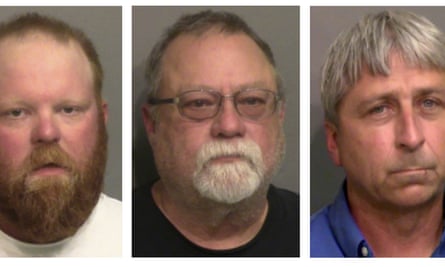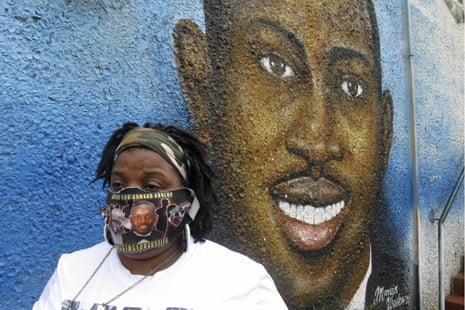The trial of three white men accused of pursuing and murdering Ahmaud Arbery in one of Georgia’s most notorious racial killings began on Monday with jury selection, a process the judge estimated could take at least two weeks.
Jury duty notices were mailed to 1,000 people in Glynn county, about one in every 85 adult residents, in an attempt to secure an unbiased panel of 12 plus four alternates for the trial of Travis McMichael, his father Greg and their friend William “Roddie” Bryan.
Selection got under way on Monday morning amid a heavy police presence outside the county superior court in Brunswick, south-eastern Georgia.
The McMichaels are accused of chasing down Arbery, who was Black, in a pickup truck as he went for a run in February 2020. Bryan allegedly joined the chase and took cellphone footage of Travis McMichael shooting Arbery, 25, with a shotgun at close range. All three deny murder.
That so many jury notices were sent, with 600 required to show up at court on Monday, and the remainder on standby for a week’s time, indicates the sensitivity of the case. Adding to the controversy was the indictment last month of its original prosecutor, Jackie Johnson, who is accused of protecting the men, one of whom, Greg McMichael, was a former employee.
The suspects remained free for more than two months until the Georgia bureau of investigations took over the case from the district attorney’s office. The men were arrested in May 2020 and a grand jury returned murder indictments the following month.
Court officials intend to complete the trial in Glynn county, but acknowledge the challenge of seating an impartial jury in a case in which the suspects and victim lived within two miles of each other, and which attracted international attention and a federal hate crime investigation.
“So many people either know the defendants or the victim or know something about it,” Ronald Adams, the Glynn county superior court clerk, told the Associated Press.
“You really don’t want to come up short on the number of qualified jurors that you have.”

Prosecutors will eventually tell the jury that Arbery, who was unarmed, was spotted and targeted by the group as he was out for a run near his home in Brunswick. The McMichaels, they say, believed Arbery was responsible for theft from a construction site, and wanted revenge, even though there is no evidence he was involved in criminal activity.
Bryan, the prosecutors will say, joined the chase, despite later presenting himself as an innocent witness to the killing.
Lawyers for the men, meanwhile, insist they acted in self-defense after Arbery attacked the McMichaels with his fists. The incident received little publicity until Bryan’s video of the confrontation was leaked online and went viral in May 2020, outraging civil rights groups who were furious that the men had not been arrested or charged.
In addition to malice murder and felony murder charges, the three are each charged with two counts of aggravated assault and one count each of false imprisonment and criminal attempt to commit false imprisonment.
Arbery’s death was one of several killings of Black people that sparked racial protests across the US last summer, including the murder of George Floyd by a white police officer in Minneapolis, Minnesota, and the death of Breonna Taylor at the hands of law enforcement officers during a raid on her home in Louisville, Kentucky.
Lee Merritt, an attorney for Arbery’s family, said last year that the weeks-long delay in the detention of those accused of murder highlighted the racial disparity of the justice system.
“All citizens are entitled to the same protection under the law,” he said. “This case makes it clear that all Black citizens in south Georgia aren’t getting the same protection because if you shoot anybody in the street in broad daylight, just in general you expect at least an arrest. There were no arrests made.”
Prospective jurors will be questioned in groups of 20 before being asked individually for opinions about issues including race, gun rights and self-defence, and what they already know about the case.
